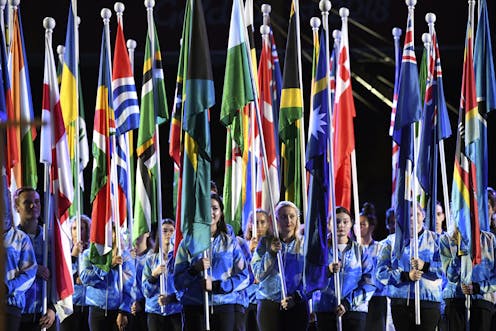Let the games begin: ten things you didn't know about the Commonwealth
- Written by Kristyn Harman, Senior Lecturer in History, University of Tasmania

Britain’s territorial vastness was neatly summed up in the Victorian era by the observation that “the sun never sets on the British Empire”. For 350 years, dating from when the East India Company was founded in 1600 until after the end of the second world war, Britain’s global reach was extensive. Yet by the closing decades of the 19th century, Britain’s empire was changing. Some of her colonies were becoming increasingly independent.
Read more: The Commonwealth Games are an opportunity to face up to the history of colonialism
Talk of a Commonwealth began almost half a century before the Commonwealth superseded Britain’s empire. When Lord Roseberry’s tour of Australia concluded with his triumphant speech at Adelaide’s Town Hall on 18 January 1884, he famously referred to the Australian colonies as a “nation” and the British Empire as a “Commonwealth of Nations”.
The birth of the modern Commonwealth
It is difficult to date precisely when the modern Commonwealth came into being. Some see it as dating from the 1926 Balfour Declaration, under which the United Kingdom and its dominions were declared “autonomous Communities within the British Empire … and freely associated as members of the British Commonwealth of Nations”. The principles set out in this declaration were enacted in the Statute of Westminster of 1931.
Others think the modern Commonwealth dates from the 1949 London Declaration. The London Declaration provided for countries to remain part of the Commonwealth even if, like India, they became republics. It also allowed countries with Indigenous monarchies to be admitted to the Commonwealth. The organisation itself changed its name from the British Commonwealth to the Commonwealth of Nations.
Read more: The Commonwealth Games of exclusion: what are authorities so afraid of?
The Commonwealth of Nations comprises 53 member states, ranging from Antigua and Barbuda to Zambia, who voluntarily work towards shared goals. The majority of these member states were once British colonies that continue to uphold values introduced by their former overlords, including a commitment to the rule of law, democracy, and human rights. English remains the organisation’s working language.
Ten things you didn’t know about the Commonwealth
The “wealth” in “Commonwealth” does not simply mean money. In the 15th century, wealth meant “general well-being”. Phrases such as “common wealth” or “common weal” were used to refer to the common good. Commonwealth is now used to refer to states governed by the people, but the sense of this ultimately being for the common good remains.
Only two member states in the Commonwealth have not been ruled either directly or indirectly by the British: Mozambique and Rwanda.
Queen Elizabeth II, who is Head of the Commonwealth, is the ceremonial head of state and reigning monarch over only 16 member states of the Commonwealth. Most of the other 37 Commonwealth states are republics, although five have monarchs other than Queen Elizabeth II.
Australia was one of seven foundational members of the Commonwealth in 1931 (its membership was ratified in 1942), alongside Canada, the Irish Free State, Newfoundland, New Zealand, South Africa, and the United Kingdom.
Three member states also have “Commonwealth” as part of their official title: the Commonwealth of Australia, the Commonwealth of The Bahamas and the Commonwealth of Dominica.
If member states are flouting the Commonwealth’s values, they may be denied ongoing membership. The country with the most fluctuating membership is Fiji, having been expelled three times. After joining in 1970, Fiji left the Commonwealth in 1987 following a coup that resulted in the elected government being overthrown and a republic being established. It was reinstated in 1997, only for Fiji to leave again three years later following another coup. Fiji was readmitted in 2001, left again in 2006 and rejoined in 2014.
Some states have chosen to leave the Commonwealth permanently, including the Irish Free State, which left the organisation in 1949, on transitioning to a republic.
What we now call the Commonwealth Games started as the British Empire Games in Hamilton, Ontario, in Canada in 1930. A name change in 1954 saw the games become the British Empire and Commonwealth Games until 1966, then the British Commonwealth Games from 1970 to 1974. It was only from 1978 that this mega event has been known as the Commonwealth Games.
Eleven teams, including one from Australia, took part in the first British Empire Games in 1930. 400 athletes competed in events ranging from track and field to boxing and wrestling. Female competitors participated solely in aquatic events.
With a population of 11,359 people in 2017, Nauru is one of the smallest member states in the Commonwealth. Formerly a German colonial possession, Nauru was administered by Australia, New Zealand and the United Kingdom following the first world war.
Read more: Can the Commonwealth Games change perceptions of the Gold Coast?
How relevant is the Commonwealth?
The Commonwealth emphasises the ties that bind its member nations together, which derive almost entirely from a shared legacy of colonisation.
Amid calls for both a treaty with our first peoples and acknowledgement of colonial atrocities such as the attempted Tasmanian genocide, the ongoing relevance of the Commonwealth of Nations must be carefully evaluated, if not seriously questioned.
While the Commonwealth has transformed over time and currently seeks to embrace greater diversity, only time will tell whether it can change rapidly enough to remain relevant in a decolonising world.
Authors: Kristyn Harman, Senior Lecturer in History, University of Tasmania



















